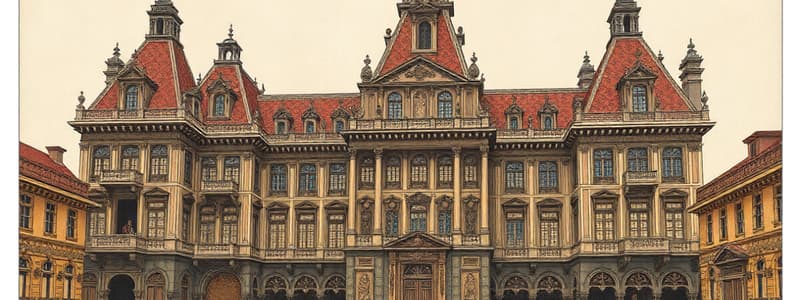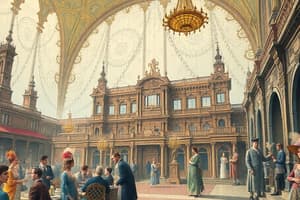Podcast
Questions and Answers
¿Cómo era el Antiguo Régimen?
¿Cómo era el Antiguo Régimen?
La sociedad del Antiguo Régimen estaba formada por estamentos y se dividía en dos grupos principales: privilegiados (nobleza y clero) y no privilegiados (Tercer Estado).
¿Quiénes eran los estamentos privilegiados en el Antiguo Régimen?
¿Quiénes eran los estamentos privilegiados en el Antiguo Régimen?
- Nobleza (correct)
- Clero (correct)
- Artisanos
- Campesinos
¿Qué era el Tercer Estado?
¿Qué era el Tercer Estado?
El Tercer Estado estaba integrado por campesinos, servidumbros, artesanos, comerciantes y ricos burgueses, la mayoría de la población sin derechos.
¿Quiénes monopolizaban los cargos eclesiásticos en el Antiguo Régimen?
¿Quiénes monopolizaban los cargos eclesiásticos en el Antiguo Régimen?
En el comercio triangular, Europa importaba ______.
En el comercio triangular, Europa importaba ______.
La Ilustración surgió del racionalismo.
La Ilustración surgió del racionalismo.
¿Qué creían los ilustrados sobre la educación?
¿Qué creían los ilustrados sobre la educación?
¿Qué filósofo definió el contrato social como un pacto entre todos los ciudadanos?
¿Qué filósofo definió el contrato social como un pacto entre todos los ciudadanos?
¿Qué influencia tuvo Locke en la política?
¿Qué influencia tuvo Locke en la política?
¿Cómo era el Antiguo Régimen?
¿Cómo era el Antiguo Régimen?
¿Quiénes eran los estamentos privilegiados?
¿Quiénes eran los estamentos privilegiados?
La Iglesia no recibía impuestos de los campesinos.
La Iglesia no recibía impuestos de los campesinos.
¿Qué es el Tercer Estado?
¿Qué es el Tercer Estado?
¿Qué tipos de comercio se mencionan en el contenido?
¿Qué tipos de comercio se mencionan en el contenido?
¿Qué nuevas formas de pensar surgieron en el siglo XVIII?
¿Qué nuevas formas de pensar surgieron en el siglo XVIII?
El sistema político liberal propuso la división de ___.
El sistema político liberal propuso la división de ___.
Relaciona a los filósofos con sus ideas principales:
Relaciona a los filósofos con sus ideas principales:
Flashcards are hidden until you start studying
Study Notes
The Old Regime
- The Old Regime social structure was divided into estates, a system based on birthright and not wealth.
- The privileged estates were the nobility and clergy, who enjoyed tax exemptions and special legal privileges.
- The nobility owned land and property, and were exempt from taxes.
- The clergy collected tithes (10% tax on crops) and held large estates.
- The nobility held political privileges like access to special courts.
- The majority of people in the Old Regime belonged to the Third Estate, including peasants, artisans, merchants, and wealthy bourgeoise, who lacked political rights.
- Peasants were commonly tenants, paying rent and feudal dues to the nobility.
- Urban artisans were governed by guild regulations that hindered innovation.
- Merchants and bankers desired access to positions of power.
The Rise of New Ways of Thinking in the 18th Century
- The Enlightenment emerged from the scientific rationalism of the 17th century.
- Enlightenment thinkers utilized reason and observation to analyze reality, challenging traditional sources of knowledge like superstition and religious revelation.
- Enlightenment thinkers aimed to explain all aspects of human knowledge, from philosophy to practical skills like optics or carpentry.
- They believed reason and science would lead to progress and happiness.
- The Enlightenment emphasized education as a tool to foster tolerance and prosperity.
The Liberal Political System
- The liberal political system is based on the separation of powers: legislative, executive, and judicial.
- The Legislative branch makes laws and is composed of a representative parliament.
- The Executive branch enforces laws and is led by a king or president, and ministers appointed from the majority party in the parliament.
- The Judicial branch is independent from the executive and ensures the enforcement of laws.
Influential Enlightenment Thinkers
- John Locke argued that the state arises from a contract between rulers and citizens.
- Locke believed government legitimacy stems from respecting natural rights to life, liberty, and property, enforced by a democratically-elected parliament.
- Locke's ideas and English Parliamentarianism influenced French Enlightenment thinkers.
- Voltaire criticized religion, privilege, and absolutism, advocating for a parliament to limit the King's power and fair taxation for all.
- Montesquieu proposed the division of powers into legislative, executive, and judicial branches.
- Rousseau defined the social contract as a pact among citizens, emphasizing the principle of national sovereignty where power derives from the consent of the people through voting.
- Enlightenment thinkers criticized the established order, advocating for equal rights, individual liberty, and a more just society.
The Triangular Trade
- The triangular trade involved exchanging goods and enslaved people between Europe, Africa, and America.
- European colonists imported raw materials from their colonies, such as sugar and cotton, and exported manufactured goods like weapons and textiles.
- The triangular trade involved the purchase of enslaved Africans from traffickers in exchange for weapons, alcohol, and other goods.
- These enslaved people were transported to the Americas, where they were forced to work on plantations under inhumane conditions.
- The triangular trade resulted in immense profits for European merchants and shareholders, but also in the tragic enslavement and suffering of millions of Africans.
The Old Regime
- The Old Regime was a society based on estates and had significant divisions between the privileged and non-privileged groups.
- The privileged groups included the nobility and clergy, who enjoyed special rights and did not pay taxes.
- The nobility possessed land, while the clergy received tithes (10% of harvest) from peasants and owned significant properties.
- The non-privileged group known as the Third Estate encompassed the majority of the population, including peasants, artisans, merchants, and wealthy bourgeois.
- The Third Estate lacked rights unlike the privileged groups.
- The majority of peasants worked as tenants or laborers on land owned by the privileged groups and had to pay rents and feudal dues.
- Urban artisans were subject to guild regulations that limited innovation.
- Wealthy merchants and bankers sought access to positions of power.
New Ideas in the 18th Century
- The Enlightenment emerged from the rationalism prevalent in the 17th century.
- The scientific revolution of the 17th century influenced the intellectual movement (Enlightenment).
- Enlightenment thinkers embraced reason and observation to analyze the world and challenged tradition, religious revelation, and superstition.
- The Enlightenment aimed to rationally explain diverse fields of knowledge, from philosophy and politics to technical subjects, believing in the progression and happiness driven by reason and science.
- The Enlightenment valued education and emphasized critical thinking and technical skills as necessary for a prosperous and tolerant society.
The Liberal Political System
- The liberal political system advocates for a division of powers among different branches of government.
- These branches are: the legislative power (Parliament), the executive power (King/President and Government), and the judicial power (Courts).
- The Parliament makes laws and approves the state budget.
- The executive branch enforces laws, appoints ministers, and follows the majority in Parliament.
- The judicial branch ensures the implementation of laws and is independent of the executive branch.
John Locke and Influence
- According to John Locke, the state emerges from a pact between rulers and individuals.
- A legitimate state respects natural rights of life, liberty, and property and has a parliament elected by the people to approve laws.
- English parliamentarism influenced French Enlightenment thinkers.
Key Liberal Thinkers
- Voltaire: Criticized religion, privilege, and absolutism, advocating for parliamentary limitations on the king's power and fairer taxation for the Third Estate.
- Montesquieu: Introduced the concept of separation of powers with a representative parliament, the executive power held by the king and ministers, and independent judges.
- Rousseau: Defined the social contract as an agreement among citizens and emphasized the principle of national sovereignty where power emanates from the consent of the citizens expressed through voting.
The Triangular Trade
- The triangular trade involved trade routes connecting Europe, Africa, and Americas.
- Raw materials such as sugar and cotton were imported from colonies to Europe.
- Europe sent manufactured goods and weapons to the colonies.
- The trade was completed with the exchange of arms and alcohol for slaves in Africa, who were transported to the American plantations.
- This triangular trade system built upon the exploitation of millions of Africans forced into inhumane working conditions and slavery.
- The trade generated substantial profits for European merchants and shareholders.
Studying That Suits You
Use AI to generate personalized quizzes and flashcards to suit your learning preferences.




